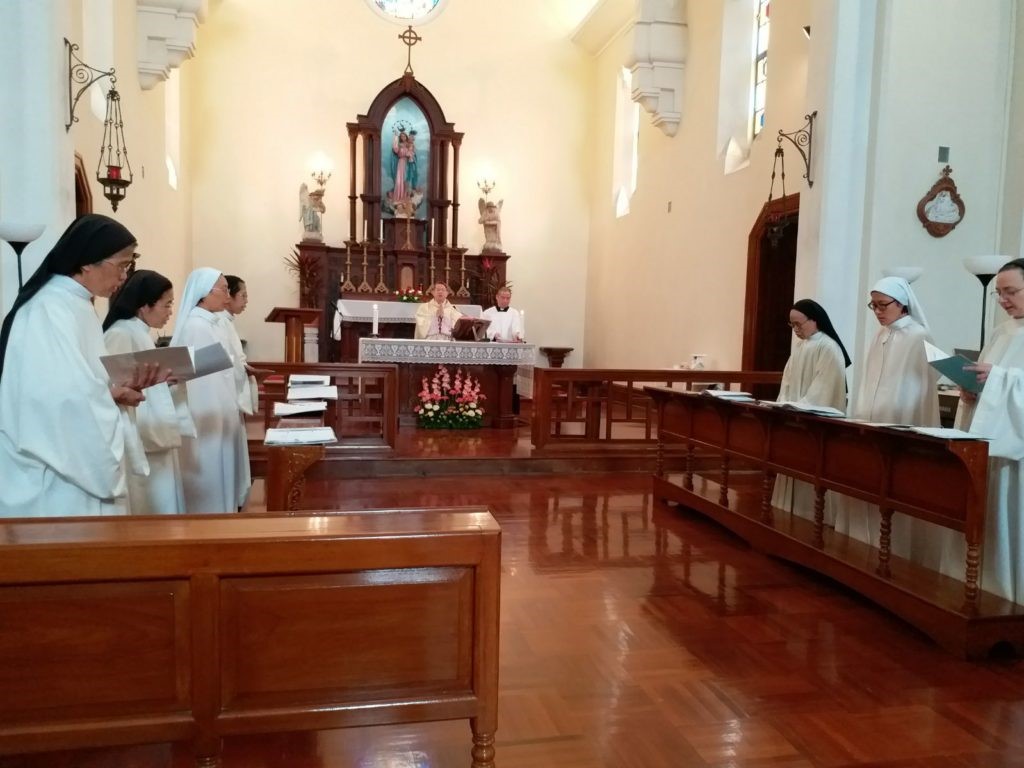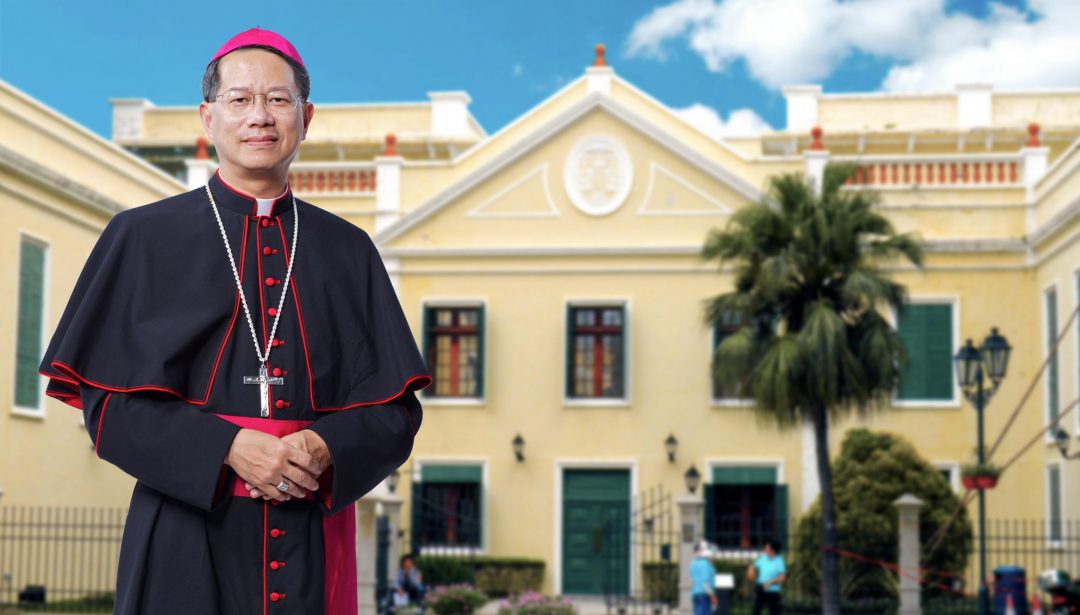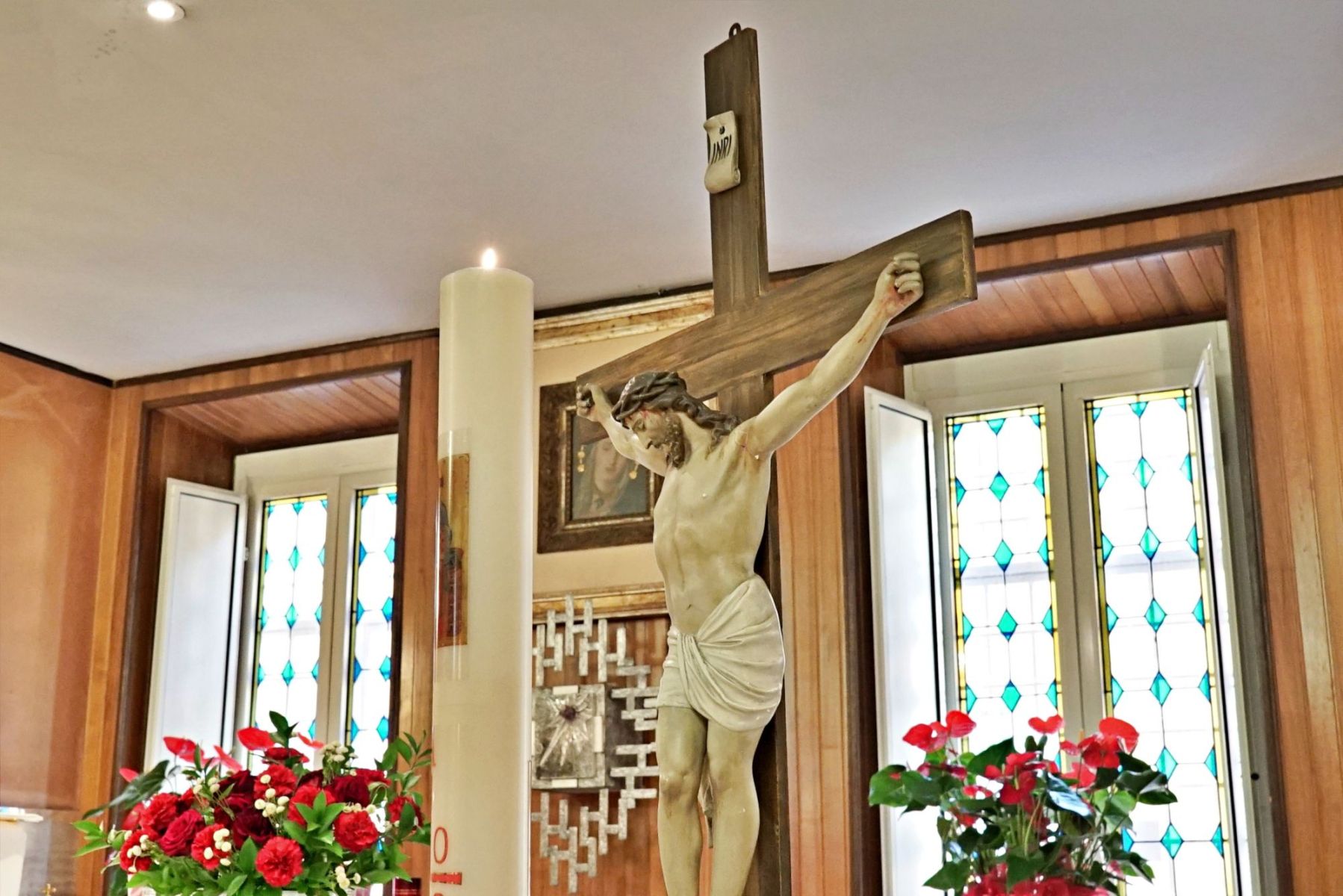– Fr Leonard E. Dollentas
I have had a lifelong curiosity about the Trappistine nuns. How do they managed to wake up so early in the morning and carried on to chant the psalms, and be still in tune? How do they managed to have music practice when absolute silence is strictly observed inside the monastery, and still sing like birds in perfect unison? Why are they facing each other inside the chapel? How do they muddle through producing those laboriously delicious cookies, jams, honey-flavored organic cough syrup (a product depending on each monastery), when they seemed to have little time for manual work?
I remember traveling once from Manila to Cotabato in the Philippines, and meeting Trappistine nuns at the airport. They were traveling back to Cotabato after a medical appointment in Manila. After our short conversation (asking them those questions), I asked the nuns to pray for me and one of them wrote my name down in her book of prayer. When I went to their monastery and celebrated Mass several years later, I was overjoyed when she showed me my name in the prayer book from years ago and told me she prayed for me daily. Prayer is essential for all Christians, but the contemplatives, like the Trappistine nuns, are called to make their whole lives a prayer in solitude, silence and community.
THE TRAPPISTINE NUNS OF THE COMMUNITY OF OUR LADY STAR OF HOPE
In the world today there are almost 38,000 cloistered nuns. These nuns seek to let go of daily distractions to free their minds and hearts for deep contemplation of God. The Diocese of Macao has received such a gift from God: The Trappistine nuns of the Monastery of Our Lady Star of Hope. They belong to the Cistercians of the Strict Observance, a religious order of monks and nuns in the Roman Catholic Church, also known as “Trappists” or “Trappistines.” Their monastery is only a walk away from the Cathedral of Macau. Its location is perfect for a heart reaching out to God – perched atop a small hill. The monastery is plain; it is not as ornate as many would expect in a former Portuguese colony building. The austerity of the place is a testimony of their conviction that by “being poor with the poor Christ,” and keeping their life very simple, it would be easier to pray and grow a deeper friendship with God. Even the community chapel is modest, peaceful and solemn. The monastery provides a little touch of nature: the good smelling trees, the golden sunrise, soft breeze, tiny chirping of the birds all lovely in cold mornings, blending with the mellow and angelic voices of the nuns in their prayers.
FOUNDATION AND EARLY BEGINNINGS
The community is a daughter community of the Trappistine Monastery of Gedono in Indonesia. This monastery in Indonesia traces its foundation from the Monastery of Vitorchiano, Italy in 1987. They officially began their regular life in Macau, as a canonical foundation dedicated to Mary, Star of the Hope on April 15, 2012. At present the community comprises six solemn professed nuns, two novices, and two newcomers. They are faithful with the Trappistine traditions and observances. They wear full, distinctive Trappistine habits with a sensible, medium-length veil. They sing the entire office in English and some portions in Chinese. This contemplative community is part of a family history of monastic life that stretches back sixteen hundred years. Its roots and beginnings in the deserts of fourth-century Egypt, moving towards the hills in sixth-century Italy and settling in the grazing land of Medieval France. For those centuries, monks and nuns have prayed, studied and worked together in joy and peace offering the world a joyful sight of life in eternity.
Faithful in following the centuries’ old Rule and monastic tradition of St Benedict, the Trappistine community of Macao gather in their community chapel seven times a day to pray, the liturgy provides a structure and discipline to the day which usher them to maintain mindfulness of God throughout the day.
The first service of the day is at 3:20 AM. With this vigil, they break the silent darkness and welcome the dawning of God’s light into the world darkened by ignorance, malice and sin. They end the day at 7:15 PM with the compline where they give thanks for the mercy they have received during the day, and pray for “a quiet night and a perfect end.”
Trappistine nuns work daily for the glory of God and the good of community. The work of the Trappistine Nuns in Macau consists of caring and cleaning the historic house and church where they live, welcoming visitors visiting the community and their small shop selling their homemade cookies, rosaries and cards. The building that they are using now is entrusted to them by the Diocese. It is a temporary solution. As the community is growing, they have been praying to acquire a larger area for a monastery closer to nature – a new monastery within Macau, where they may continue their life of witnessing in prayer and in manual work of toiling God’s abundant nature. Their request for a land concession for a monastery was rejected by the Macau Government in 2016. They were disappointed, but they accepted it in trust and hope in God’s providential plan for them.
PRAYERS SUSTAIN THE SPIRITUAL NEEDS OF THE DIOCESE
At the entrance of the monastery one can easily notice the prayer intention drop boxes, where visitors entrust their prayer intentions to the nuns. A number of Catholics and even non-Catholics weighed down and in pain, suffering, frustrated and experiencing misfortunes, commend themselves to the prayers of the nuns for consolations. Sometimes, the nuns find some petitions that are rather amusing: people asking God for some enormous amount of luck in the casino, for more money, more prosperity blessings, and so on. The nuns would still lift them up to God, holding them close in prayer, that they may see their true joy in their dignity and value as persons. Their prayer continuously unites them to each other in community and intercedes for the larger Church and the needs of this rapidly changing and stressed world.
Pope Francis leads everyone to the awareness that when the contemplatives lift-up to God the concerns of the world, their prayers became “missionary prayers.” In his homily on his mid-day prayer with the Contemplative Women Religious of Lima, Peru, Pope Francis described a missionary prayer: This means being able to stand alongside the suffering of so many of our brothers and sisters, and to say with the Psalmist: “In my distress I called upon the Lord; the Lord answered me and set me free” (Ps 117:5). In this way, your cloistered life can attain a missionary and universal outreach and play “a fundamental role in the life of the Church. You pray and intercede for our many brothers and sisters who are prisoners, migrants, refugees and victims of persecution. Your prayers of intercession embrace the many families experiencing difficulties, the unemployed, the poor, the sick, and those struggling with addiction, to mention just a few of the more urgent situations. You are like those who brought the paralytic to the Lord for healing. Through your prayer, night and day, you bring before God the lives of so many of our brothers and sisters who for various reasons cannot come to him to experience his healing mercy, even as he patiently waits for them. By your prayers, you can heal the wounds of many” (ref.: Apostolic Constitution Vultum Dei Quaerere on women’s contemplative life, 29 June 2016).
No doubt our Trappistine nuns are keeping their prayers as missionary as possible. Their witnessing assures us that in our triumphs and joys, there are prayers reaching up to God in grateful thanksgiving. In our weariness, their presence assures us that there are small voices murmuring before God, pleading for grace and strength. In our frailty and sinfulness, they strengthen us through their divine worship, that we may find our way back to the loving embrace of the Father’s forgiveness. We may never have the chance to meet them in person, but they keep us dearly in their hearts…in their hidden prayers and solitude.


 Follow
Follow


